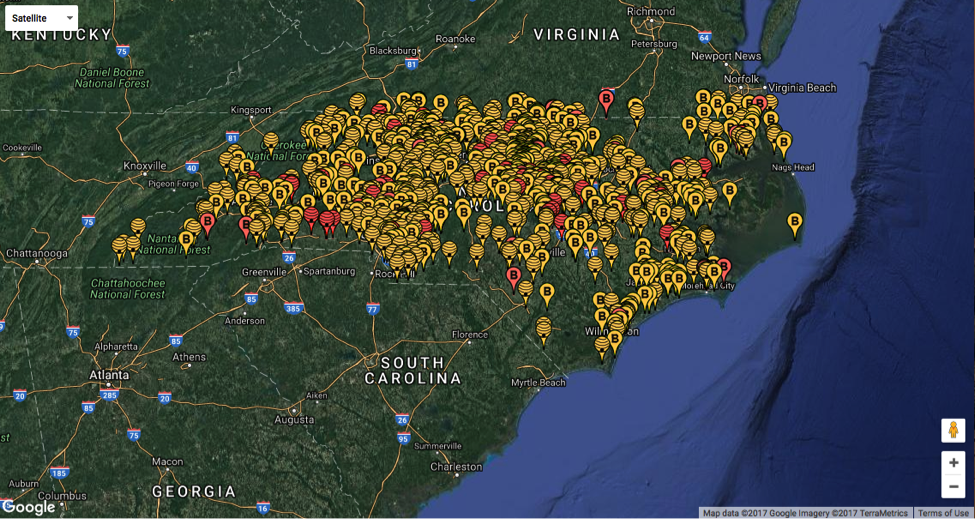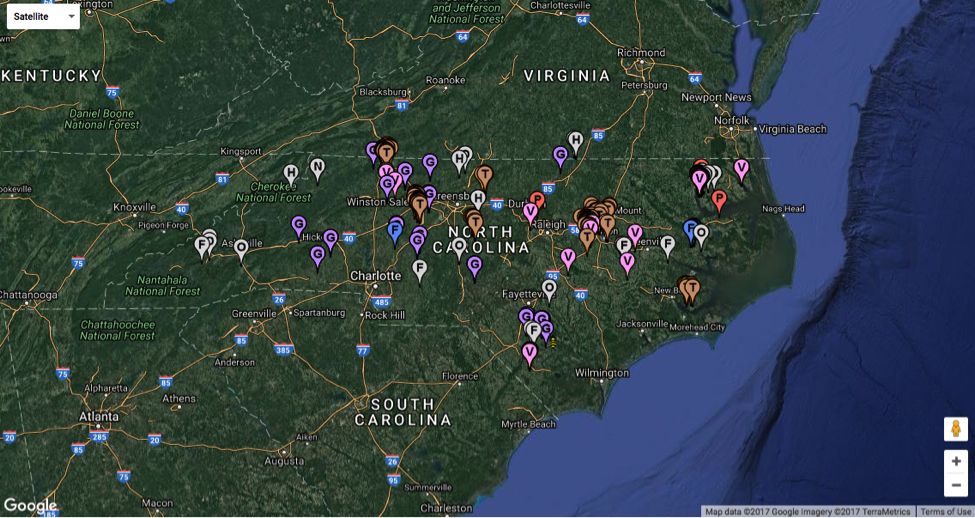
By Patricia Patterson, Toxic Free NC Policy Advocacy Intern
In July of 2015, among growing concern for pollinator populations and the need for growers and beekeepers to communicate more effectively about pesticide application, the North Carolina Department of Agriculture requested $27,750 from the Pesticide Environmental Trust Fund to register the state for online mapping programs through FieldWatch. FieldWatch, Inc., formerly known as DriftWatch, is a non-profit organization dedicated to supporting pollinator protection and human health and safety through the implementation of mapping registry programs. DriftWatch and BeeCheck are programs under FieldWatch, Inc. that map and track specialty crops and beehives. These online programs allow both organic and conventional farmers to register the location of their fields and/or beehives as well as access locations of surrounding fields and apiaries.
The FieldWatch map mimics Google Earth with registered locations displayed as color-coded pins. While it may be simple to filter between conventional and organic growing conditions and crop types on the map, users are deprived of distance accuracy in heavy-registered areas. Pesticide applicators may not access all surrounding apiary/field locations on FieldWatch due to the voluntary registration policy and location overload. Aside from the location pins on the map, FieldWatch does not provide a method for gauging the relative distance from an apiary or field to a user’s location, and it does not provide the exact location of a beehive (see Figure 1). Beekeepers may register several hives under one address, but FieldWatch does not monitor the exact location of each hive. Oversights such as these can lead to misinformation, pesticide drift, and can cause harmful pollinator and crop damage.

In North Carolina, approximately 34 fields are registered in FieldWatch as “organically grown” or certified organic; 16 of those are certified organic, and 18 are “organically grown.” About 250 fields are registered as “conventionally grown” (see Figure 2). Unlike organic farmers, conventional farmers apply synthetic chemicals such as fertilizers and pesticides to their crops. The mishandling of pesticides by conventional farmers, including unregistered conventional farmers, can impact the health of pollinators in North Carolina and damage surrounding crops. The prevalence of conventional farming indicates a need for greater communication between beekeepers and farmers that choose to use pesticides, a need that may not be met due to the lack of total participation by all farmers and beekeepers in North Carolina.

Thousands of North Carolinian farmers and beekeepers may not be registered in FieldWatch because of technological and educational barriers. FieldWatch states that those who do not own a computer should contact their state’s data steward to create an account. For non-computer users, this contact information, provided online under FieldWatch’s “Contact Us” page, may not be accessible. Potential users may also be unaware of FieldWatch due to its current voluntary policy for crop site registration and insufficient marketing for farmers without access to a computer. The North Carolina Department of Agriculture promotes the use of FieldWatch when they are doing outreach with beekeepers. This effort has led to the registration of 6,180 beehives, approximately 1,452 apiary locations, on FieldWatch. However, only a few hundred pesticide applicators have registered among over 50,000 farmers across the state. This is a prime example of how beekeepers disproportionately bare the burden of keeping their bees away from pesticides. The state of North Carolina possess the opportunity to reduce local crop damage and promote pollinator protection, but operating under a voluntary crop site registration policy restricts the potential for positive change for our environment and food systems.
